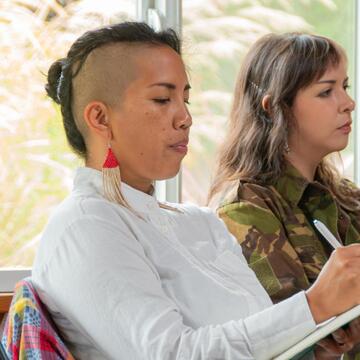
Master of Arts in Women, Gender, Spirituality, and Social Justice
Integrate social justice, ecological healing, and spiritual transformation in our two-year, online master’s degree.
Program Overview
Our Approach
We believe that activism is a form of sacred practice. CIIS’ master’s in Women, Gender, Spirituality, and Social Justice honors the spiritual impulses that have guided movements for equality and justice across the globe.
This program is best suited to those who are interested in developing a visionary approach to their work as activists, educators, healers, facilitators, artists, and socially conscious entrepreneurs.
Our transdisciplinary program invites you to engage in deep academic and personal inquiry by developing an individualized course of study within broad areas of scholarship including: ecofeminism/ecology, women in world religions, mysteries, sacred arts, healing, diversity and social justice, spiritual activism and leadership.
Career Paths
Our program has a strong emphasis on social justice and seeks to make an impact on the world at large by providing students with the tools to think deeply and critically about local and transnational issues, and to affect change through an integrative approach to education that values the spiritual dimensions of our human experience.
We recognize that there is no clearly paved career trajectory for someone with a degree in women's spirituality; much depends on your objective, self-motivation, and entrepreneurship. Our curriculum includes a course on vocation design to give you tools for career creation.
- Academia, research and education
- Policy making and consulting
- Social entrepreneurship
- NGOs and nonprofits
- Creative arts
- Restorative justice, and many more
Curriculum
The online master’s in Women, Gender, Spirituality, and Social Justice at CIIS requires 36 units of coursework and can be completed in two full-time years or three part-time years.
Our online format draws students from across the U.S. and the world and includes both synchronous and asynchronous virtual classrooms.
We value our community of Women’s Spirituality scholars and offer a range of opportunities to connect beyond curricular activities:
- Community Circles and Program Meetings (online, attendance strongly encouraged; occur 1-2 times each semester)
- Fall Retreats (in-person, attendance strongly encouraged; 4 days in September shortly after the semester begins; no virtual attendance, though some portions might be recorded)
- Spring Retreats and CIIS Commencement (in-person, attendance strongly encouraged and recommended for graduating students and their families & loved ones; 1-2 days in May the same weekend as CIIS Commencement)
- Student-led Community Building Initiatives (in-person and online), which have formed around studying, writing, and activism
Curriculum Highlights
PARW 6286 Building Conscious Allyship
This course introduces students to some of the basic frameworks that support engagement with diversity in respectful and transformative ways. We will provide a safe space in which students will have the opportunity to review their own social/historical location and explore the connections between spirituality, liberation, and knowledge. Using a diversity of tools and techniques, we will create a forum in which students will deepen their ability to effectively dialogue across differences and begin the process of building meaningful alliances.
PARW 6421 Animal Ethics: Ecofeminist/Ecowomanist Perspectives
Ancient spiritual wisdom and contemporary scientific findings both refute Descartes’ assertion that nonhuman animals are automatons devoid of consciousness or feeling. Nonetheless, the view of animals as machines undergirds many of our modern practices, such as factory farming and animal experimentation. How have Western philosophical trajectories, economic systems, and linguistic practices led to our ethical myopia concerning animals? What resources do our philosophical and spiritual traditions have to offer as we reconsider our ethical stance toward animals? In addition to exploring these questions, this course will highlight the emergence of veganism as an ethical response to animal exploitation and food injustice. Particular attention will be paid to ecofeminist and ecowomanist analyses of the links among sexism, racism, and speciesism.
PARW 6425 Gender, Power, and Spirit in Indigenous Cultures
This class will explore the legacy of Indigenous women throughout the world on a path of power (leaders, healers, shamans, ceremonialists) and the spiritual images and stories of the cultural contexts in which they exist. A unique opportunity presents itself to understand the sacred through their spirituality, leadership, practices, and activism. The emphasis of the class will be on exploring Indigenous women’s lives, worldviews, transformations, narratives, and values to uncover recurring Indigenous themes that have global relevance today for our planet and all living beings. These themes will be elucidated didactically and experientially, and there will be opportunities to dialogue and relate in a manner consistent with Indigenous oral traditions and kinship paradigms.
-
I. Required foundational courses (16 units)
- Writing that Matters: Foundational Skills for Transformative Scholarship
- Critical Thinking and Liberatory Methods
- Building Conscious Allyship
- Sacred Lineages: Goddesses, Foremothers, and Activists
- Spirit, Compassion, and Community Activism
- Womanist, Feminist, and Decolonial Worldviews
- Spiritual Activism and Transformative Social Change
II. Directed electives (11 units)
With consultation of the academic advisor, students take courses that support their primary areas of academic and professional interest.
III. General electives (6 units)
Students take six units from any program at CIIS, depending on availability.
IV. M.A. Integrative Seminar (3 units)
In this course, students are mentored in the preparation of a portfolio or advanced research paper. Students draw together the knowledge, insights, and skills of their coursework, and especially of their chosen area of study. They work with the library to refine their research skills. They review relevant methodologies and issues of epistemology in preparation for the completion of the degree.
Entry Requirements
If you would like to learn more about this program, we’re here to help. Explore our program further with in-depth materials, discuss your personal and career goals at one of our open houses, or get in touch with our admissions counselors, who are ready to assist you in navigating the application process.
Required Application Materials
Your application is your opportunity to share who you are. To be considered essays and written responses must be your own authentic work.
Online Admissions Application: Begin the application process by submitting an online application and paying the nonrefundable $68 application fee.
Degree Requirement: A bachelor’s degree from an accredited college or university.
Minimum GPA: A GPA of 3.0 or higher in previous coursework is required. However, a GPA below 3.0 does not automatically disqualify an applicant and CIIS will consider a prospective student whose GPA is between 2.0 and 3.0. These individuals are required to submit a GPA Statement and are encouraged to contact the Office of Admissions to discuss their options.
Transcripts: Official transcripts from all accredited academic institutions attended where 7 or more credits have been earned. Transcripts may be sent digitally to materials@ciis.edu or mailed to CIIS in their official, sealed envelope. Transcripts from institutions outside the U.S. or Canada require a foreign credit evaluation through World Education Services (WES). CIIS will also accept foreign credential evaluations that are in a comprehensive course-by-course format from the current members of the National Association of Credential Evaluation Services (NACES).
Admissions Essay: A six-page maximum (typed, double-spaced) short-answer essay questions:
- What inspires you to apply to the M.A. program in Women, Gender, Spirituality, and Social Justice?
- What does women’s spirituality mean to you?
- What courses or topical areas are you most interested in and why?
- Our program is academically rigorous. What tools have you developed to manage your time, engage in complex projects, and meet deadlines?
- Our program centers collaboration and community. What skills and capacities do you bring to learning in community?
- We value diversity in both identity and perspective. Our community includes people of many different religious, racial, ethnic, gender, national and class backgrounds. Conflicting points of view will emerge in the classroom and community spaces. Tell us about an experience where you encountered conflict in a community setting. How did you navigate this situation? What did you learn from it?
- What inner resources have you developed for handling stress, challenges, and disappointments?
- Tell us about a time when you had to receive difficult feedback on your academic or professional work. How did you integrate this feedback and grow from this experience?
Goal Statement: People apply to our program with diverse goals. Some of our students seek to earn an M.A. as a step toward a future Ph.D. program, while others join the M.A. program to advance career and personal goals. Please share your specific goals and how they align with the Women, Gender, Spirituality, and Social Justice mission and vision. Describe how your previous or current professional and/or academic work has prepared you for our program. How do you see our curriculum and faculty supporting your goals? Feel free to name specific courses, faculty, or areas of research. Two-page maximum (typed, double-spaced).
Academic Writing Sample: A writing sample of eight-to-ten pages (typed, double-spaced) that demonstrates your capacity to think critically and reflectively and demonstrates graduate level writing abilities. A sample that uses outside sources must include proper citations. You may submit copies of previous work, such as a recent academic paper, article, or report that reflects scholarly abilities.
Two Letters of Recommendation: Letters will be accepted from academic advisors, professors, professional supervisors, or someone able to attest to your ability to undertake the work required for your program. Recommenders should use standard business format and include full contact information-name, email, phone number, and mailing address.
Candidate Selection
The master’s in Women, Gender, Spirituality and Social Justice is an interdisciplinary degree that integrates a number of fields in the humanities and social sciences. Applicants must meet the general admission requirements of CIIS and demonstrate the potential to be successful in this academically rigorous program.
Successful candidates for admission into this M.A. program typically have the following qualifications:
- A vision that is compatible with the program's mission
- A commitment to personal and social transformation
- An ability to think critically and creatively
- Respect for a diversity of viewpoints
- Sufficient maturity and stability to pursue independent inquiry
- Scholarly writing skills
Events and Info Sessions
Attend our in-person event on January 31 or online event on February 21. Get to know CIIS professors and community, and learn more about our bachelor's, master's, Ph.D. and professional certificate programs.



Take the Next Step
For over 50 years, CIIS has been at the forefront of education that integrates rigorous science, innovative scholarship, and social justice. You will learn from faculty at the forefront of their fields, local artists and activists, and a community of peers as passionate and dedicated as you. There’s never been a better time to be here – let’s build a healthier and more equitable world.


